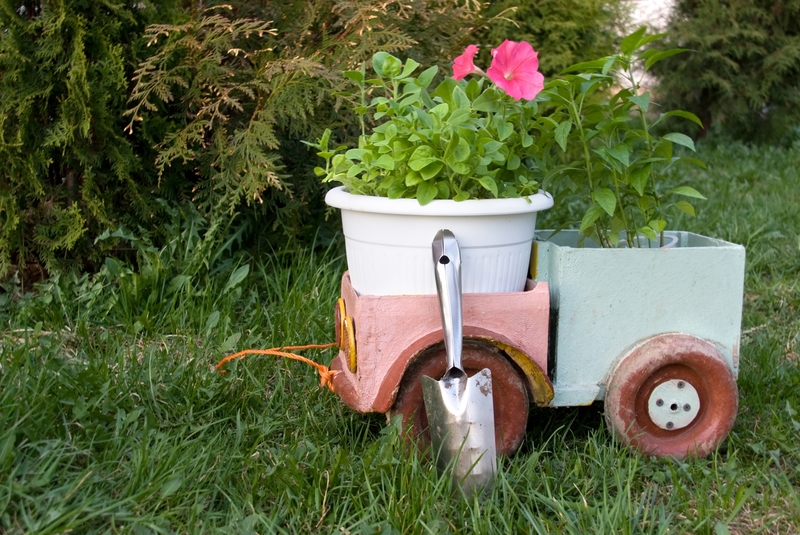Plant Pot Disposal Made User-Friendly: A Comprehensive Guide
Are you a gardener, plant enthusiast, or someone who's just updated their outdoor space only to be left with piles of empty pots? Plant pot disposal is a common challenge faced by home gardeners and commercial landscapers alike. With so many pots made from plastic, ceramic, terracotta, and other materials, knowing how to responsibly dispose or repurpose them makes a big difference to the environment and your community.
This comprehensive article dives deep into user-friendly plant pot disposal options, guiding you through smart, eco-forward, and simple methods. We'll discuss recycling programs, upcycling ideas, donation options, and practical disposal tips for various pot materials. Say goodbye to clutter and hello to responsible disposal!

Why Does Proper Plant Pot Disposal Matter?
Disposing of old plant pots may seem straightforward, but improper methods can contribute to landfill waste and environmental degradation. Millions of plastic pots, in particular, end up in landfills each year, where they take centuries to degrade. Many cities do not accept plastic pots in curbside recycling, and terracotta or ceramic pots can complicate the waste stream. By learning about user-friendly plant pot disposal methods, you play a role in promoting sustainability, resource conservation, and a cleaner planet.
- Reduce environmental impact
- Support local communities and gardeners
- Increase your garden's eco-friendliness
- Create opportunities for creativity through repurposing
Different Types of Plant Pots and Their Disposal Needs
Understanding what your plant pot is made from is the first step to easy plant pot disposal. Here's a breakdown of common materials and their disposal requirements:
1. Plastic Plant Pots
- Lightweight, affordable, and often made from various plastics (sometimes unmarked).
- Not usually accepted in curbside recycling due to mixed resins and soil residue.
- Can sometimes be recycled at dedicated drop-off centers or garden centers.
2. Terracotta and Clay Pots
- Porous, natural material, breaks down over long periods.
- Heavy; not accepted in regular recycling.
- Can be repurposed, donated, or disposed of as inert waste.
3. Ceramic Plant Pots
- Glazed or unglazed; decorative, durable.
- Not recyclable curbside; should not be put in recycling bins.
- Excellent for reusing, upcycling, or donation.
4. Biodegradable Pots
- Made from peat, coir, wood fiber, or paper.
- Can be composted if untreated by chemicals.
- Simple to dispose with garden or food waste in most areas.
Best Practices for User-Friendly Plant Pot Disposal
Now that you know what type of pots you're dealing with, let's look at how to get rid of them responsibly. Here are proven, sustainable, and user-friendly plant pot disposal strategies:
1. Reuse and Repurpose Your Plant Pots
- Refill and Replant: The easiest method! Sterilize and reuse pots for cuttings, new seedlings, or to swap out seasonal displays.
- Household Organizers: Use for storing tools, craft supplies, or kids' crayons.
- Creative Garden Projects: Stack, paint, or drill old pots to make fairy gardens, wind chimes, or vertical planters.
- Seed Starting: Smaller pots are perfect for starting seeds indoors or outdoors.
- Pet Bowls: Clean, sterilized pots make unique water or food bowls for pets outdoors!
*Reusing is often the most user-friendly option for plant pot disposal -- it requires minimal effort and extends the life of your pots.*
2. Donate Plant Pots in Good Condition
Many organizations and individuals appreciate pot donations. Consider:
- Community gardens: They often welcome pots, especially during planting season.
- Schools and nonprofits: For art projects or student gardens.
- Local nurseries and garden centers: Some have take-back or reuse programs.
- Online platforms: Give away for free on social media, Freecycle, Craigslist, or neighborhood groups.
When donating, ensure pots are clean and free from plant debris and soil to prevent the spread of plant diseases.
3. Recycling Plant Pots Responsibly
While curbside recycling may not accept plant pots, many local garden centers partner with specialized recycling programs. Here's how to make the process user-friendly:
- Call your nearest garden center or hardware store and ask about plastic pot recycling events.
- Check your local municipal waste management website for up-to-date drop-off locations.
- Separate and clean your pots at home to streamline recycling and improve acceptance.
- Group #2 or #5 plastic pots, as these are most commonly recycled.
*Pro Tip: Never put ceramics or terracotta pots in recycling bins--they can damage processing equipment.*
4. Composting Biodegradable Pots
If you use biodegradable pots, plant pot disposal is truly user-friendly! Simply:
- Tear pots into smaller pieces if they're thick-walled to speed decomposition.
- Add to your backyard compost pile, municipal green bin, or directly into your garden bed.
- This is a zero-waste solution for pots made from peat, coir, or untreated wood fiber.
5. Proper Disposal for Broken Pots
For pots that are cracked, broken, or extensively weathered:
- Terracotta and ceramic fragments can be used as drainage material in the base of larger pots.
- Crush broken clay or ceramic pots for use as garden path material.
- If disposal is necessary, put in landfill bag or inert waste category, not general recycling.
Making Plant Pot Disposal Easy for You
Let's face it: gardening isn't just about planting--it's about cleanup, too. Here's how busy gardeners can make plant pot disposal as user-friendly as possible:
- Set Up a Sorting Station: Dedicate a spot in your garage or shed to organize pots by material.
- Team Up With Neighbors: Share ride or drop-off duties to recycling centers with gardening friends.
- Label and Clean: Clear labeling (by number or type) helps you sort and store pots for the long term.
- Stay Up to Date: Regulations and recycling schemes change--periodically check for local updates.
Myth-Busting: Plant Pot Recycling Facts
-
Myth: All plant pots are recyclable.
Fact: Only certain numbered plastics are processed by recycling centers. -
Myth: You can put ceramic pots in recycling.
Fact: Ceramics can contaminate recycling streams--dispose as inert waste or upcycle instead. -
Myth: Cleaning doesn't matter.
Fact: Dirt and debris can ruin an entire recycling batch--always rinse pots before donating or recycling.
Creative Upcycling Ideas for Old Plant Pots
Give your old pots a new life and reduce waste! Here are user-friendly, fun ways to creatively upcycle old plant pots:
- DIY Bird Bath: Stack pots and dishes to make a patio bird bath or water feature.
- Garden Markers: Paint pots and use as oversized labels for herbs and vegetables.
- Holiday Decorations: Decorate pots for seasonal displays--pumpkins for Halloween, holly for Christmas, etc.
- Fairy Gardens: Break or stack pots artistically to create fairy house displays.
- Pencil or Tool Holders: Brighten your workspace with custom pot holders for desk supplies or tools.
These upcycling methods are not only eco-friendly plant pot disposal solutions but are also enjoyable and rewarding. Involve your children or local community for group projects!
How to Find Local Plant Pot Disposal Resources
Check Local Recycling Guidelines
Municipal recycling programs vary widely. Visit your city's or county's official waste management website to search for terms like "plant pot recycling," "garden pot drop-off," or "plastic nursery pot disposal."
Seek Out National and Local Initiatives
- Home improvement stores: Some offer springtime or year-round drop-off points for plastic pots.
- Botanical gardens: Many operate reuse or swap programs.
- Garden clubs & Master Gardener groups: These networks often collect and distribute used pots to schools and community gardens.
If you can't find a program locally, consider sending a polite note to garden centers or city officials--expressing community support can kick-start new eco-friendly plant pot disposal programs!
Frequently Asked Questions About Plant Pot Disposal
Can I put plant pots in my recycling bin?
Usually not. Regular recycling may not process pots unless it's a #2 or #5 plastic pot and specifically accepted by your local facility.
What can I do with cracked or worn-out pots?
Repurpose them in your garden (as drainage or path substrate), upcycle for crafts, or dispose of as landfill if unusable. Terracotta and ceramic bits are inert but not recyclable as glass or plastics.
Are biodegradable pots safe to compost?
Yes, as long as they're untreated and made from natural materials like peat, coir, or untreated paper or wood fiber.
Is it safe to use secondhand pots?
Definitely--just sterilize old pots with a hydrogen peroxide, bleach, or vinegar rinse to kill pathogens before replanting.

Eco-Friendly Reminders for Responsible Plant Pot Disposal
- When in doubt, look it up! Every city has slightly different disposal policies.
- Clean pots thoroughly to make them more likely to be reused or recycled.
- Encourage your community to adopt sustainable plant pot disposal practices and share knowledge.
- Choose better materials next time--buy biodegradable pots or those made from recycled plastics for easy future disposal and recycling.
Conclusion: Make Plant Pot Disposal Effortless
Dealing with plant pots is a natural part of every gardener's life. With the right approach, plant pot disposal can be friendly for both users and the environment. By following the strategies above--reuse, donate, recycle, compost, or upcycle--you not only help keep waste out of landfills but inspire others in your family, neighborhood, or gardening group to act responsibly too.
Remember, every small action counts. Start by sorting your pots today, checking local reuse or recycling options, and picking a creative project for your next rainy day. Plant pot disposal made user-friendly is not a dream--it's a new habit, and together we can make our gardens and communities greener!
Share this comprehensive guide with your gardening friends and community groups to promote effective and sustainable plant pot disposal methods, and contribute to a cleaner, healthier world for everyone.